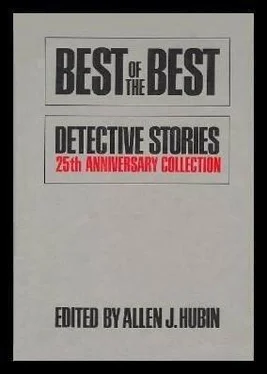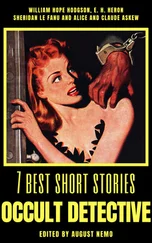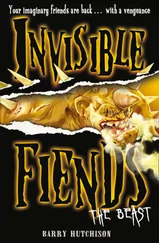Stephen Barr - Best of the best detective stories - 25th anniversary collection
Здесь есть возможность читать онлайн «Stephen Barr - Best of the best detective stories - 25th anniversary collection» весь текст электронной книги совершенно бесплатно (целиком полную версию без сокращений). В некоторых случаях можно слушать аудио, скачать через торрент в формате fb2 и присутствует краткое содержание. Город: New York, Год выпуска: 1971, ISBN: 1971, Издательство: E.P. Dutton & Co., Жанр: Детектив, на английском языке. Описание произведения, (предисловие) а так же отзывы посетителей доступны на портале библиотеки ЛибКат.
- Название:Best of the best detective stories: 25th anniversary collection
- Автор:
- Издательство:E.P. Dutton & Co.
- Жанр:
- Год:1971
- Город:New York
- ISBN:978-0-525-06450-3
- Рейтинг книги:5 / 5. Голосов: 1
-
Избранное:Добавить в избранное
- Отзывы:
-
Ваша оценка:
- 100
- 1
- 2
- 3
- 4
- 5
Best of the best detective stories: 25th anniversary collection: краткое содержание, описание и аннотация
Предлагаем к чтению аннотацию, описание, краткое содержание или предисловие (зависит от того, что написал сам автор книги «Best of the best detective stories: 25th anniversary collection»). Если вы не нашли необходимую информацию о книге — напишите в комментариях, мы постараемся отыскать её.
Best of the best detective stories: 25th anniversary collection — читать онлайн бесплатно полную книгу (весь текст) целиком
Ниже представлен текст книги, разбитый по страницам. Система сохранения места последней прочитанной страницы, позволяет с удобством читать онлайн бесплатно книгу «Best of the best detective stories: 25th anniversary collection», без необходимости каждый раз заново искать на чём Вы остановились. Поставьте закладку, и сможете в любой момент перейти на страницу, на которой закончили чтение.
Интервал:
Закладка:
Neely was the first to notice. “Granny!” he said. “Granny?” Then, “It must be your pipe—”
The Marquess was overcome with confusion and remorse. “Terribly sorry,” he declared. “I’d knock the dottle out, except that’s all it is , you know — dottle, I mean. I say, Mrs. Goodeycoonce — oh, I say.”
But Mrs. Goodeycoonce’s face had taken on an almost masculine appearance. She rolled up first one fist, loosely, and then the other, placed them in alignment, lifted them to her eyes, and peered out upon the River. And in a gutturally accented and heavy voice quite unlike her usual tones she declared, “Zound der alarm! Beat to qvarters! Zo, zo, wat den duyvel! ”
The Marquess’ eagle-keen eyes followed her glance and immediately observed something very much amiss upon the waters.
“Stap my vitals, if I don’t believe a gel is being forced aboard that vessel over there,” he said. “Bad show, that. What?”
Instantly the possessing spirit of Peter Stuyvesant vanished and was replaced by that of Mrs. Goodeycoonce. She uttered a cry. “White slavery, that’s what it must be! And in broad daylight, too. Oh, the brazen things! What should we do?”
Neely hauled an old-fashioned but quite authentic and brass-bound telescope from his pocket and swung it around. As he focused in and recognized Daisy, struggling desperately while being taken up the gangway, he uttered a hoarse shout of rage.
“ ‘Do’?” he yelled. “We’ve got to save her! Come on! My boat! Let’s go! ”
The black pigeon passed over City Hall, dallied for a few moments in the currents around the Woolworth Building, and then pressed on in the general direction of Sand Street...
As Neely’s boat zoomed under the bow of the yacht, the Marquess kicked off his shoes, seized the anchor chain, and swarmed up like a monkey. Neely and Denny were met at the foot of the gangway ladder by two crewmen, who shouted, gesticulated, and menaced them with boathooks. But in a moment the boatmen’s attention was diverted by a tumult from above. Part of this was caused by Lord Grue and Groole who, darting from one place of concealment to another, called out (in different voices) battle cries in Pathan, Kikuyu, and Demotic Greek; and part of it was caused by the alarm of the crew at being boarded — so they thought — by a host of foes.
While their opponents’ attention was thus distracted, Denny and Neely gained the deck where Neely at once knocked down the first sailor he saw. Denny’s contribution was more circumspect. Noting an oily rag in a corner he took out a match. In a moment clouds of black smoke arose.
“Fire!” cried the Dip. “Fire! Fire! ”
Part of the crew promptly swarmed down the ladder into Neely’s boat and cast off. The rest jumped over the side and commenced swimming briskly toward the nearer shore.
“Hello!” Neely shouted, stumbling along the passageways, opening doors. “Hello, hello! Where are you?”
A muffled voice called, he burst in, and there was Daisy, gagged and bound, struggling in a chair. Neely cut her loose, removed the gag, and — after only a very slight hesitation, perhaps natural in a shy young man of good family — kissed her repeatedly.
“Well,” said Daisy tremulously, as he paused for breath, and then to herself, “I guess he’s not such a milksop after all.”
On deck Denny the Dip and the Marquess stomped out the smoldering rag, though not, however, in time to avoid having attracted two police boats, a Coast Guard cutter, the Governor’s Island ferry, a Hudson River Dayliner, and the New York City Fireboat, Zophar Mills , all of which converged on the yacht.
“Thank you, thank you,” called out the Marquess, between cupped hands. “We don’t require any assistance, the fire is out. You will observe, however, that officers and crew have abandoned the ship, which means that she is now, under maritime law, by right of salvage, the property of myself and my associates, both in personam and in rem .”
The failure of the engines to start, it was ascertained after a careful scrutiny, was owing to the intrusion of a large waterbug into one of the oil lines; this was soon set right. An attempt of a floating delegate of the Masters, Mates, and Pilots Union to question the Marquess’ right to take the helm of the salvaged vessel was quickly terminated by the revelation that he possessed a first-class navigation certificate in the Siamese Merchant Marine. The delegate addressed him henceforth as “Captain,” and on departing, offered him the use of all the amenities of the Union Hall.
It was while seeing this personage off that Lord Grue and Groole observed a familiar shadow on the deck of the yacht, and, taking off his quasi-caracul and waving it, lured Sauncepeur down from what the poet Pope once so prettily described as “the azure realms of Air.”
“She has clutched a quarry,” he observed. “Well-footed, my pretty, well-trussed. Let me have pelt, dearie — nay, don’t mantle it — there. Good. You shall have new bewits, with bells, and silver varvels to your jesses, with my crest upon them. Hel-lo, hel -lo, what have you done , you demned vulture? You’ve taken a carrier pigeon!” He opened the message capsule. “Bombs Away,” he read. “Rum, very rum. Doubtless the name of a horse, and some poor booby of a bookmaker has taken this means of evading the puritanical Yankee laws dealing with the dissemination of racing intelligence. Hmm, well, not my pidjin. Haw, haw!” he chuckled at the pun. “Denny!” he called.
“Yes, M’Lord?”
The Marquess tossed him the bird. “A pigeon for the pot. See that Sauncepeur gets the head and the humbles; afterwards she’s to have a nice little piece of beefsteak, and a bone to break.”
That, in a way, concludes the story. The epilogue is brief. Don Lefty McGonigle, though heartborken at the abrupt and (to him mysterious) disappearance of his son-in-law and daughter, takes some comfort in the frequent picture postcards that Philomena sends him from such places as Tahiti, Puntas Arenas, Bulawayo, and other locales where the Mafia’s writ (fearsomely hard on deserts) runneth not. The Nafia (originally organized in 1880 under the full name of the National Federal of Independent Artisans, a “Wide Awake” or Chowder and Marching Society as part of the presidential campaign of General Winfield Scott Hancock, whose famous declaration that “the tariff is a local issue” insured his defeat by General J. Abram Garfield) — the Nafia still controls all the gumball and Indian nut machines south of Vesey Street; and revels in the publicity resultant from its members’ brief incarceration, along with Tosci, the Project Supervisor, and the three crewmen. The Cherry Street Mob would not dream of muscling in on a syndicate whose pictures were in all the papers in connection with a portfolio containing $87,000,000; it is the Mob’s belief that the fight was caused by the Nafia’s attempting to hijack this sum.
Cornelius (“Neely”) and Daisy Goodeycoonce have purchased, out of their share of the salvage money, one of the most up-and-coming bait-and-boatyard businesses on Long Island Sound. Granny Goodeycoonce at first was reluctant, but on learning that Daisy’s mother was a Van Dyne, of the (originally) Bergen-op-Zoom, Holland, Van Dynes, she extended her blessings. It remains her view, however, that the family profession of noctural customs collecting is merely in abeyance, and will be kept in trust, as it were, for the children.
Granny is, in fact, for the first time in her life, no longer a Goodeycoonce, but Mistress of Snee, Lady of Muckle Greet, Baroness Bogle, Countess Ballypatcoogen, Viscountess Penhokey, Marchioness of Grue and Groole — and, presumably, Lord High Keeperess of the Queen’s Bears — although on this last point Debrett’s is inclined to be dubious. The fact that the older couple has chosen to go on a prolonged honeymoon with their yacht to the general vicinage of the Sulu Sea where, those in the know report, the opportunities for untaxed commerce (coarsely called “smuggling” by some) between the Philippines, Indonesia, and British North Borneo are simply splendid, is doubtless purely coincidental.
Читать дальшеИнтервал:
Закладка:
Похожие книги на «Best of the best detective stories: 25th anniversary collection»
Представляем Вашему вниманию похожие книги на «Best of the best detective stories: 25th anniversary collection» списком для выбора. Мы отобрали схожую по названию и смыслу литературу в надежде предоставить читателям больше вариантов отыскать новые, интересные, ещё непрочитанные произведения.
Обсуждение, отзывы о книге «Best of the best detective stories: 25th anniversary collection» и просто собственные мнения читателей. Оставьте ваши комментарии, напишите, что Вы думаете о произведении, его смысле или главных героях. Укажите что конкретно понравилось, а что нет, и почему Вы так считаете.












